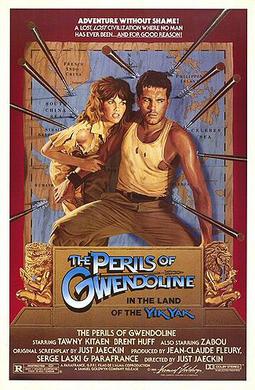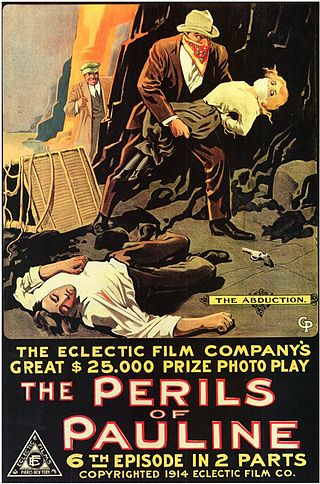
Bondage pornography is the depiction of sexual bondage or other BDSM activities using photographs, stories, films or drawings. Though often described as pornography, the genre involves the presentation of bondage fetishism or BDSM scenarios and does not necessarily involve the commonly understood pornographic styles. In fact, the genre is primarily interested with the presentation of a bondage scene and less with depictions of sexuality, such as nudity or sex scenes, which may be viewed as a distraction from the aesthetics and eroticism of the sex scenario itself.
John Alexander Scott Coutts, better known by the pseudonym John Willie, was an artist, fetish photographer, cartoonist, and the publisher and editor of the first 23 issues of the fetish magazine Bizarre between 1946 and 1956, featuring his characters Sweet Gwendoline and Sir Dystic d'Arcy. Though distributed underground, Bizarre magazine had a far-reaching impact on later fetish-themed publications and experienced a resurgence in popularity, along with fetish model Bettie Page, beginning in the 1970s.

Bondage, in the BDSM subculture, is the practice of consensually tying, binding, or restraining a partner for erotic, aesthetic, or somatosensory stimulation. A partner may be physically restrained in a variety of ways, including the use of rope, cuffs, bondage tape, or self-adhering bandage.

The damsel in distress is a narrative device in which one or more men must rescue a woman who has been kidnapped or placed in other peril. Kinship, love, lust or a combination of those motivate the male protagonist to initiate the narrative.

The music of Indiana was strongly influenced by a large number of German and Irish immigrants who arrived in the 1830s. A prime example is "I'll Take You Home Again, Kathleen" written by Thomas Westendorf, from Hendricks County, Indiana, in 1875.

Die Ärzte is a German rock band from Berlin. The band has released 14 studio albums. The group consists of guitarist Farin Urlaub, drummer Bela B and bass player Rodrigo González. All three write and perform their songs.

The Perils of Gwendoline in the Land of the Yik-Yak is a 1984 French action comedy film directed by Just Jaeckin, written by Jaeckin and John Willie and starring Tawny Kitaen and Brent Huff. The film is loosely based on the bondage-themed comics of Willie and on the character of Sweet Gwendoline. François Schuiten worked as a graphic designer for the film.
Rufus is an American funk band from Chicago, Illinois, best known for launching the career of lead singer Chaka Khan. They had several hits throughout their career, including "Tell Me Something Good", "Sweet Thing", "Do You Love What You Feel" and "Ain't Nobody". Rufus and Chaka Khan were one of the most popular and influential funk bands of the 1970s, with four consecutive number-one R&B albums, ten top 40 pop hits and five number-one R&B singles, among other accolades.

Peter Ronald Brown was an English performance poet, lyricist, and singer best known for his collaborations with Cream and Jack Bruce. Brown formed the bands Pete Brown & His Battered Ornaments and Pete Brown & Piblokto! and worked with Graham Bond and Phil Ryan. Brown also wrote film scripts and formed a film production company.

"Home! Sweet Home!" is a song adapted from American actor and dramatist John Howard Payne's 1823 opera Clari, or the Maid of Milan. The song's melody was composed by Englishman Sir Henry Bishop with lyrics by Payne. Bishop had earlier published a more elaborate version of this melody, naming it "A Sicilian Air", but he later confessed to having written it himself.
Community Trolls was the group name of a short-lived musical duo between Michael Stipe of R.E.M. and Matthew Sweet. In 1983, they collaborated as part of the Athens, Georgia, music scene, writing and recording three songs together. One of the compositions, "Tainted Obligation", was nearly released on a compilation album in 1986, and later appeared on bootlegs; it was released officially in 2002. Another Community Trolls' song, "Six Stock Answers", appeared in an unreleased indie film featuring Stipe, Sweet and some of their friends.

"Ain't She Sweet" is a song composed by Milton Ager, with lyrics by Jack Yellen. It was published in 1927 by Ager, Yellen & Bornstein, Inc. It became popular in the first half of the 20th century and typified the Roaring Twenties. Like "Happy Days Are Here Again" (1929), it became a Tin Pan Alley standard. Both Ager and Yellen were elected to the Songwriters Hall of Fame.

Ab 18 [Over 18] is the sixth album by German rock band Die Ärzte. It is an EP compilation of which three songs were put in the German List of Media Harmful to Young People. The album was banned in Germany on 10 December that same year. The banned songs were, at the time, "Geschwisterliebe", "Claudia hat 'nen Schäferhund" and "Schlaflied". As of 2022, only "Geschwisterliebe" is still banned and Streaming Services like Spotify offer the album to German Users in a censored version that omits that song.

"Mama Tried" is a song written and recorded by American country music artist Merle Haggard and The Strangers. It was released in July 1968 as the first single and title track from the album Mama Tried. The song became one of the cornerstone songs of his career. It won the Grammy Hall of Fame Award in 1999, and was selected for preservation in the National Recording Registry due to its "cultural, historic, or artistic significance" on March 23, 2016, just 14 days before Haggard's death. In 2021, it was ranked at #376 on Rolling Stone's "500 Greatest Songs of All Time".

"Mona Lisa" is a popular song written by Ray Evans and Jay Livingston for the Paramount Pictures film Captain Carey, U.S.A. (1949), in which it was performed by Sergio de Karlo and a recurrent accordion motif. The title and lyrics refer to the renaissance portrait Mona Lisa painted by Leonardo da Vinci. The song won the Academy Award for Best Original Song in 1950.

BDSM is a frequent theme in culture and media, including in books, films, television, music, magazines, public performances and online media.

The Perils of Pauline is a 1914 American melodrama film serial produced by William Randolph Hearst and released by the Eclectic film company, shown in bi-weekly installments, featuring Pearl White as the title character, an ambitious young heiress with an independent nature and a desire for adventure.

The Velvet Underground was an American rock band formed in New York City in 1964. It originally comprised singer and guitarist Lou Reed, Welsh multi-instrumentalist John Cale, guitarist Sterling Morrison, and drummer Angus MacLise. In 1965, MacLise was replaced by Moe Tucker, who played on most of the band's recordings. Though their integration of rock and the avant-garde resulted in little commercial success, they became one of the most influential bands in rock, underground, experimental, and alternative music. Their provocative subject matter, musical experiments, and nihilistic attitude was also instrumental in the development of punk rock, new wave and several other genres.
Gwendoline is a feminine given name.
Charles Guyette was a pioneer of fetish style, the first person in the United States to produce and distribute fetish art, and regarded as the mail-order predecessor of Irving Klaw. Later known as the "G-String King," he is best remembered for his bizarre photographs, some of which featured sadomasochistic content.















